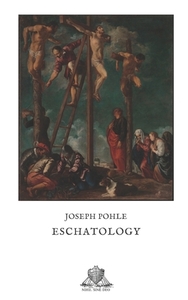Take a photo of a barcode or cover
Eschatology is the doctrine of the last things. Catholic Eschatology breaks down into eschatology of the individual, and eschatology of the human race as a whole. Individual judgment, heaven, hell, and purgatory are discussed under the topic of individual eschatology. Preceding signs, resurrection, and the general judgment fall under eschatology for the human race. Scripture as well as the writings of various Christian teachers found throughout the ages are used to support the teachings.
Catholic eschatology is not so different from other non-millenarian Christian teachings other than the idea of purgatory. I always thought of purgatory as exclusive Catholic teaching, but according to Wikipedia the Eastern Orthodox Church, Oriental Orthodox Churches, elements of the Anglican, Lutheran, and Methodist traditions, and even Rabbinic Judaism hold to similar ideas. Purgatory signifies a process of cleansing whether it is a place or a state. The author appeals to Isa 35:8, 1 Cor 3:11-15, 1 Cor 15:29, and apocryphal passages 2 Maccabees 12:42-45, Wisdom 7:25, Tobit 4:18. The objections of Reformers are noted.
Catholic eschatology is not so different from other non-millenarian Christian teachings other than the idea of purgatory. I always thought of purgatory as exclusive Catholic teaching, but according to Wikipedia the Eastern Orthodox Church, Oriental Orthodox Churches, elements of the Anglican, Lutheran, and Methodist traditions, and even Rabbinic Judaism hold to similar ideas. Purgatory signifies a process of cleansing whether it is a place or a state. The author appeals to Isa 35:8, 1 Cor 3:11-15, 1 Cor 15:29, and apocryphal passages 2 Maccabees 12:42-45, Wisdom 7:25, Tobit 4:18. The objections of Reformers are noted.
